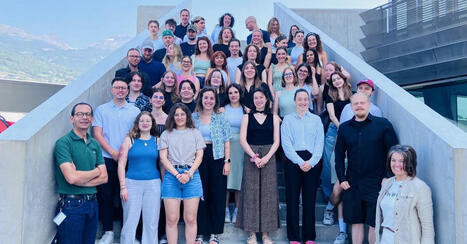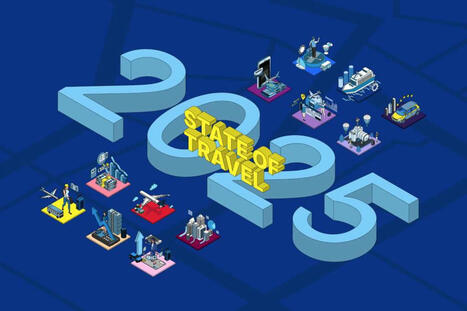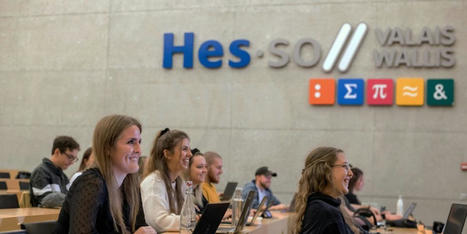 Your new post is loading...
 Your new post is loading...

|
Scooped by
Roland Schegg
July 20, 8:50 AM
|
Trek interminable en pleine jungle, ascension de l’Everest sans expérience préalable: de quoi la quête contemporaine de défis extrêmes est-elle le symptôme?

|
Scooped by
Roland Schegg
July 10, 9:14 AM
|
"Im Rahmen der ÖW-Sommerpotenzialstudie 2025 wurde das Reiseverhalten von Urlauber:innen mit Hund näher untersucht.
Mit einem Anteil von 5 % (= 7,8 Mio.) aller Sommer-Reiseplanenden aus den zehn betrachteten Märkten stellen Reisende mit Hund eine zwar kleine, jedoch interessante Zielgruppe dar. Sie finden sich in allen Altersgruppen, überdurchschnittlich oft bei den 55 bis 64-Jährigen. Zwei Drittel dieser Gruppe sind Frauen. 39 % haben bereits Urlaub in Österreich gemacht und für fast jede(n) (86 %) ist Österreich im Relevant Set der kommenden drei Jahre.
Sie verreisen überdurchschnittlich oft (viele Kurzreisen) und haben dabei hohe Ansprüche. Zur Anreise bevorzugen sie deutlich häufiger das Auto und das Wohnmobil. Auch bei der Wahl der Unterkunft gibt es mit Ferienwohnungen/-häuser eine klare Präferenz. Camping ist bei dieser Zielgruppe ebenfalls beliebter. Obwohl sie weniger oft das Flugzeug nutzen, liegen ihre Gesamtausgaben pro Reise nur knapp unter dem Durchschnitt aller Sommer-Reiseplanenden."

|
Scooped by
Roland Schegg
June 24, 4:22 AM
|
In a European travel market shaped by innovation, platforms, and AI hype, the traveler remains a creature of habit. Phocuswright’s Europe Consumer Travel Report 2025 reveals that while interest in emerging tools like generative AI is growing fast, most European travelers still prioritize ease, price, and trust. Travel demand remains strong in key markets, with online travel agencies (OTAs), social media, and traditional booking methods anchoring behavior.
Key takeaways
Travel demand is up:Travelers in the UK, France, and Germany continue to increase their travel activity.
OTAs outpace general search: Online travel agencies have become more influential than general search engines in the planning phase.
Generative AI interest is growing: Usage of generative AI has doubled year-over-year, though it remains primarily exploratory.
Indirect booking on the rise: Travelers favor indirect booking channels that allow price and option comparisons.
Payment habits are traditional: Credit cards remain the dominant method for booking and in-destination purchases.
Social media is a key influencer: Instagram leads in shaping travel decisions, while YouTube dominates for content consumption.
Travelers stay resilient: Despite broader uncertainties, most European travelers plan to travel in the next 12 months without major cutbacks.
Digital convenience trumps novelty: New technologies matter—but platforms that offer simplicity, reliability, and value still come out on top.

|
Scooped by
Roland Schegg
June 14, 3:10 AM
|
Studierende der HES-SO denken Abenteuertourismus neu
Tourismus-Studierende der HES-SO Wallis präsentieren Geschäftskonzepte, die neue Zielgruppen für den Abenteuertourismus erschliessen sollen.
Rund 60 Studierende im vierten Semester des Studiengangs Tourismus an der HES-SO Wallis haben unter realen Bedingungen 13 Geschäftskonzepte für den Abenteuertourismus entwickelt. Im Zentrum des praxisorientierten Projekts standen die Fragen, wie sich neue Zielgruppen gewinnen lassen und welche Angebote im dynamischen Tourismusmarkt langfristig behaupten können.

|
Scooped by
Roland Schegg
May 18, 11:14 PM
|
Dans un contexte où la montagne est confrontée à des défis climatiques, économiques et sociétaux majeurs, la Compagnie des Alpes engage une transformation profonde de sa stratégie. Loin de se cantonner à l’exploitation de domaines skiables, elle affirme aujourd’hui une posture nouvelle, où l’investissement dans l’humain, la biodiversité et l’habitabilité des territoires devient aussi stratégique que le rendement financier.
Cette mutation se traduit par des engagements concrets, tels que l’atteinte du Net Zéro Carbone d’ici 2030, la participation à des programmes de restauration écologique comme Nature 2050, et le développement de partenariats industriels pour la production de dameuses électriques dans les Alpes françaises. Rencontre avec David Ponson, Directeur de la Division Montagne et activités outdoor de la Compagnie des Alpes, qui nous éclaire sur cette métamorphose silencieuse mais décisive.

|
Scooped by
Roland Schegg
May 15, 2:28 AM
|
Airbnb has been collecting user data to lay the groundwork for the future of the app: A digital travel concierge that learns and adapts to each individual user.
Over the past few years, Airbnb has encouraged users to complete their profiles — answering questions like 'What are you obsessed with?' and selecting up to 20 personal interests. At the time, it may have felt like a feature with no real purpose.
But all that data has laid the groundwork for the future of the app: A digital travel concierge that learns and adapts to each individual user.

|
Scooped by
Roland Schegg
April 30, 6:41 AM
|
The way people travel for work is changing. Bleisure travel -blending business trips with leisure time- has moved from a growing trend to an established part of travel

|
Scooped by
Roland Schegg
April 26, 12:54 AM
|
Earth Day might have passed, but according to research from Booking.com, consumer awareness of travel's impact on destinations is increasing.
The online travel company’s Travel & Sustainability Report 2025, which gathered opinions from more than 30,000 travelers across 34 countries, paints a more positive picture when it comes to sentiment surrounding the impact of travel.
While in previous reports in 2023 and 2024, many travelers (28%) expressed their fatigue around hearing about climate change and questioned whether their personal actions made a difference, this year's report revealed that sustainability is important for most travelers (84%).

|
Scooped by
Roland Schegg
April 23, 3:06 AM
|
As the travel industry works to meet the needs of environmentally conscious customers, the question remains: How can the sector ensure good intentions do in fact have a tangible impact? While many express a preference for sustainable travel, behavior while traveling differs.
Insights from Accor, Radisson Hotel Group, NH Hotel Group and Phocuswright offer strategies to tackle this sustainability behavior gap, with a focus on the importance of education and how technology can support more responsible travel decisions.
“We have been doing sustainability for a very long time. We had our first program in the early 2000s,” said Inge Huijbrechts, chief sustainability and security officer at Radisson Hotel Group. “We were the first hotel company worldwide to carbon compensate all our meetings and events worldwide.”

|
Scooped by
Roland Schegg
April 7, 10:29 AM
|
Das Arbeitsgericht des Kantons Genf hat entschieden, dass die Online-Plattform Smood unter den Landes-Gesamtarbeitsvertrag des Gastgewerbes fällt. Dies bedeutet bessere Arbeitsbedingungen für die Mitarbeitenden. Das Urteil ist noch nicht rechtskräftig.

|
Scooped by
Roland Schegg
March 27, 11:19 AM
|
L’électromobilité n’est pas un phénomène éphémère: cette technologie va se substituer aux combustibles fossiles et révolutionner les déplacements. Ces dernières années, les ventes de véhicules électriques neufs ont fortement augmenté dans le monde entier. À l’heure actuelle, en Suisse, un véhicule nouvellement immatriculé sur trois est pourvu d’une prise de recharge. Et cette part va continuer d’augmenter: les voitures électriques deviendront le type de propulsion le plus vendu dans la prochaine décennie, comme le montrent les prévisions (Swiss eMobility, scénario 2035:Pénétration du marché des véhicules électriques)

|
Scooped by
Roland Schegg
March 19, 1:22 PM
|
Die EHL Hospitality Business School präsentiert den Bericht «Food and Well-Being 2025». Zentrale Erkenntnisse: Ernährung fördert Wohlbefinden, Konsumtrends setzen auf Gesundheit und Nachhaltigkeit. Herausforderungen bleiben Fehlinformationen und ungleicher Zugang.

|
Scooped by
Roland Schegg
March 19, 3:39 AM
|
The IMD Travel Future Readiness Indicator ranks 33 of the world’s largest travel companies - including OTAs, hotels, airlines, and cruise lines - based on their preparedness for the future. Industry leaders such as Booking Holdings, Airbnb, Delta Air Lines, and Marriott stand out for their ability to innovate and adapt.
Key Insights
Financial Strength Fuels Innovation: Future-ready travel companies leverage strong cash flow to invest in mature technologies, securing long-term competitive advantages.
AI and Automation Drive Change: AI-powered travel agents like OpenAI’s Operator and China’s Manu are disrupting traditional booking models by enabling autonomous trip planning.
Personalization and Sustainability are Crucial: Companies are enhancing guest experiences through AI-driven customization, responsible tourism, and services catering to wellness and solo travelers.
The Rise of 'Bleisure' Travel: The blending of business and leisure travel is shaping industry strategies, requiring brands to offer flexible and experience-driven services.
The findings are further explored in Travel’s AI Revolution: Balancing Tech and Touch, a report analyzing how airlines, OTAs, hotels, and cruise lines are adapting to this evolving landscape.
|

|
Scooped by
Roland Schegg
July 18, 2:09 AM
|
There is an apocryphal ancient curse: “May you live in interesting times”. We in the travel industry are certainly living through an interesting time for tourism in 2025.
After a smooth take-off at the start of the year, the travel industry quickly hit turbulence as concerns about trade, tariffs, and policy weighed on the global economy. Make no mistake, the state of travel in 2025 remains strong. Our industry continues to grow. Travel has shown impressive resilience in a world tested by macroeconomic uncertainty and evolving consumer expectations.
Then there is the pace of technology. Machine learning, once the gold standard for artificial intelligence is now table stakes. Travel technologists have gotten their footing with generative AI tools and are scaling LLMs even as we start to look forward to an agentic future. Changes in how businesses and consumers use AI could upend the long-established competitive landscape. Interesting times, indeed

|
Scooped by
Roland Schegg
July 9, 12:22 AM
|
Sarah Balet, chercheuse en tourisme régénératif à l'institut Tourisme de la HES-SO Valais-Wallis était l'invitée du Podcast NOUVELLES VOIES dédié à l'entreprise régénérative.
Dans cet épisode intitulé Voyager autrement : le tourisme peut-il devenir régénératif ? Sarah Balet partage les résultats de ses recherches et son expérience de terrain. On y parle d’une nouvelle manière de concevoir les séjours, à la fois plus responsables et plus puissants, pour les visiteurs comme pour les hôtes.

|
Scooped by
Roland Schegg
June 18, 1:52 PM
|
Die Hotellerie steht an einem Wendepunkt: Zwischen Resilienz, KI und Kooperation skizziert Zukunftsforscher Harry Gatterer sieben mögliche Szenarien. Ein Gespräch über die Hotel-Schweiz von morgen – und warum es gefährlich ist, sich mit «weiter wie bisher» zufriedenzugeben.

|
Scooped by
Roland Schegg
May 21, 3:30 AM
|
Despite persistent global uncertainties, Expedia Group’s 2025 Traveler Value Index shows that the desire to travel remains undeterred and even strengthened. The report, based on responses from over 11,000 consumers in 11 countries, reveals that leisure travel remains a top priority, with a marked increase in international travel intent and a clear shift in how consumers get inspired, make decisions, and define value in travel. Trust, social media influence, and the appeal of flexible, blended travel are shaping the future of tourism more than ever before.
Key takeaways
Travel remains a top priority:
88% of consumers plan to take a leisure trip in the next 12 months.
68% aim for international travel - a 19% increase since 2022.
Half of respondents say travel is more important now than five years ago.
Blended travel is on the rise:
Flexcations and bleisure trips are gaining popularity, especially among travelers under 40 who want to combine work and leisure.
Social media and influencers are transforming travel inspiration:
61% use social media to find trip ideas (up from 35% in 2022).
73% say influencer recommendations have impacted their travel decisions.
Among travelers under 40, this figure rises to 84%.
Trust and reviews are as important as price:
58% expect to be more price-conscious in the coming year.
75% are willing to pay more for lodging with better reviews.
Younger travelers (80%) place high value on trusted, well-reviewed accommodations.
Loyalty programs continue to influence bookings:
83% prefer to redeem loyalty points for travel.
82% are open to using non-travel loyalty programs (like credit cards) to book trips.
Regional & generational insights:
Chinese (87%), UK (77%), and German (72%) consumers are most likely to plan international travel.
Contactless experiences are valued by Chinese travelers; Germans prioritize flexible refunds.
Car rentals remain price-driven, but reviews hold strong sway for younger travelers.

|
Scooped by
Roland Schegg
May 16, 1:43 AM
|
"Airbnb’s latest push into locally run experiences and on-demand amenities marks a strategic move to capture more of the $1 trillion travel experience economy.
Airbnb on Tuesday unveiled the much-anticipated relaunch of its experiences offering. Airbnb will add more options for large attractions – particularly through guided tours — though there remains a focus on niche, curated, and locally run experiences.
The company also debuted a new services product, which allows consumers to order hotel-like amenities to their Airbnb. And these services aren't just for travelers: Local residents can also order them.
The numbers are potentially big: Airbnb said it would invest up to $250 million and CEO Brian Chesky has previously talked about a goal for launching businesses that could do $1 billion a year in revenue."

|
Scooped by
Roland Schegg
May 8, 5:20 AM
|
Are we at the start of a Golden Age of Wellness tourism? Certainly, figures from the Global Wellness Institute suggest we are. The Institute forecasts a 25% increase in the value of international wellness tourism over the next two years to around $8.5tr. It is also increasingly guiding the choices of European travellers. According to tourism and travel data agency Mabrian, there has been a four-point rise, over the past few years, in the percentage of people citing well-being as the main motivation for their stay.

|
Scooped by
Roland Schegg
April 28, 11:15 AM
|
Over the last couple of decades, technology has modernized the travel industry by streamlining bookings, enhancing digital customer experiences and making travel more accessible and efficient. Now, it’s time for technology to play a larger role, beyond the basics of bookings, to help solve harder-to-fix challenges like alleviating overtourism and empowering small businesses in developing regions.
In short, technology—done well—has the potential to transform tourism into a positive force in support of sustainability and economic inclusion.
By reducing intermediaries, redistributing tourism demand and integrating sustainability into core operations, travel technology has the potential to create a more equitable and resilient global travel landscape.

|
Scooped by
Roland Schegg
April 26, 12:51 AM
|
Like the rest of the travel industry, the future of the tours and activities sector will be altered by some form of AI, though exactly how remains to be seen. The evolution of the in-destination experience aided by AI was discussed during part two of Phocuswright’s The New Age(nts) Trend Series, an online event led by Mike Coletta, senior manager of research and innovation at Phocuswright.
Panelists Alex Bainbridge, CEO of Autoura, co-founder and CEO of TripSchool Mitch Bach and Janette Roush, senior vice president of innovation and chief AI officer at Brand USA, joined Coletta for a wide-ranging, in-depth and informative conversation.
“We feel strongly that some of the recent capabilities of generative AI models have significant implications for the in-destination experience. Specifically, advanced computer vision capabilities allow them to understand surroundings and context really well, and advanced real-time voice capabilities enable very natural conversations,” Coletta said. “And together, these stand to revolutionize how travelers tour neighborhoods and sites of interest, get recommendations and interact with locals.”

|
Scooped by
Roland Schegg
April 9, 1:11 AM
|
Position description
Acquire, carry out and manage R&D projects in one or more of the above-mentioned fields.
Collaborate with regional, national and international companies, public institutions and universities to develop high-impact projects.
Establish partnerships with companies, universities and partner schools at regional, national and international levels.
Disseminate scientific results through articles and presentations at conferences.
Teach at Bachelor’s and Master’s levels in the corresponding subject areas at the School of Management.

|
Scooped by
Roland Schegg
April 4, 5:22 AM
|
Wellness tourism is a dynamic and rapidly expanding segment of the global travel industry, reshaping how individuals approach travel by prioritizing self-care, personal enrichment, and transformative experiences. According to the Global Wellness Institute, this sector, defined as “travel associated with the pursuit of maintaining or enhancing one’s personal well-being,” is projected to reach an impressive $1.3 trillion USD by 2025.

|
Scooped by
Roland Schegg
March 19, 1:24 PM
|
Food as the cornerstone of well-being: Food has evolved far beyond its traditional role as a source of sustenance. Once viewed primarily as a means to satisfy hunger and later as a status symbol, food now touches nearly every layer of Maslow’s hierarchy of needs. It nurtures not only the body but also mental health, a sense of community and supports planetary well-being, enabling the balance between human prosperity and the health of earth’s ecosystems. The concept of Food Well-Being (FWB) captures this multifaceted impact, highlighting food's role in bringing pleasure, purpose, health and sustainability into daily life.
Consumer trends and the conscious shift: Driven by heightened post-pandemic awareness and access to information, consumers today are more informed than ever and are increasingly prioritizing health, transparency, as well as sustainability in their food choices. This shift is shaping new expectations and offers for the hospitality industry, from personalized nutrition to plant-forward menus and tech-enhanced dining experiences. A growing number of consumers seek food that is healthy and adjusted to their personal needs while still being convenient and quick.
Hospitality’s role in promoting well-being: The industry is positioned and expected to influence well-being at multiple levels. Through innovative practices like nature dining emersions, planetary diet offers, social eating initiatives or even just small shifts in their existing offering, hospitality providers can create environments that support both hedonic (pleasure-driven) and eudaimonic (purpose-driven) well-being.In recent years, chefs have taken a prominent role in these efforts, but everyone in the business, from line cooks and servers to management, has an important part to play. This highlights the growing importance of cross-disciplinary, continuous education to meet these expectations effectively.
Challenges and opportunities: While the rise of the conscious consumer signals progress, it also presents challenges, such as the increased spread of misinformation, addressing systemic inequalities in access to healthy food and navigating the complexities of sustainable food sourcing. Innovations in technology and education, alongside stronger commitments to shared responsibility, offer pathways to address these issues. The report highlights that achieving meaningful impact will require collaboration across sectors, embracing diverse perspectives and scaling innovative solutions to create more equitable and sustainable food systems.

|
Scooped by
Roland Schegg
March 19, 3:55 AM
|
Future-ready companies are distinguishing themselves by strategically balancing technological advancement with authentic human connection.
The travel industry in 2025 is shaped by key trends including AI technology, personalized experiences, responsible tourism, and ‘bleisure’ – the blending of business with leisure. Companies must adapt by adopting eco-friendly practices, deploying AI at scale for personalization, offering unique experiences, providing wellness services, and catering to solo travelers.
Future-ready companies include Booking.com, Delta Air Lines, and Marriott, based on their robust performance in relevant metrics.
AI agents, like OpenAI’s Operator and China’s Manu, are revolutionizing travel booking, potentially disrupting traditional travel agencies by enabling autonomous trip planning.
|

 Your new post is loading...
Your new post is loading...
 Your new post is loading...
Your new post is loading...
















![[PODCAST] Voyager autrement : le tourisme peut-il devenir régénératif ? | Innovation and trends in tourism | Scoop.it](https://img.scoop.it/7Eewe9pIUcXQvOVdiAb41jl72eJkfbmt4t8yenImKBVvK0kTmF0xjctABnaLJIm9)












